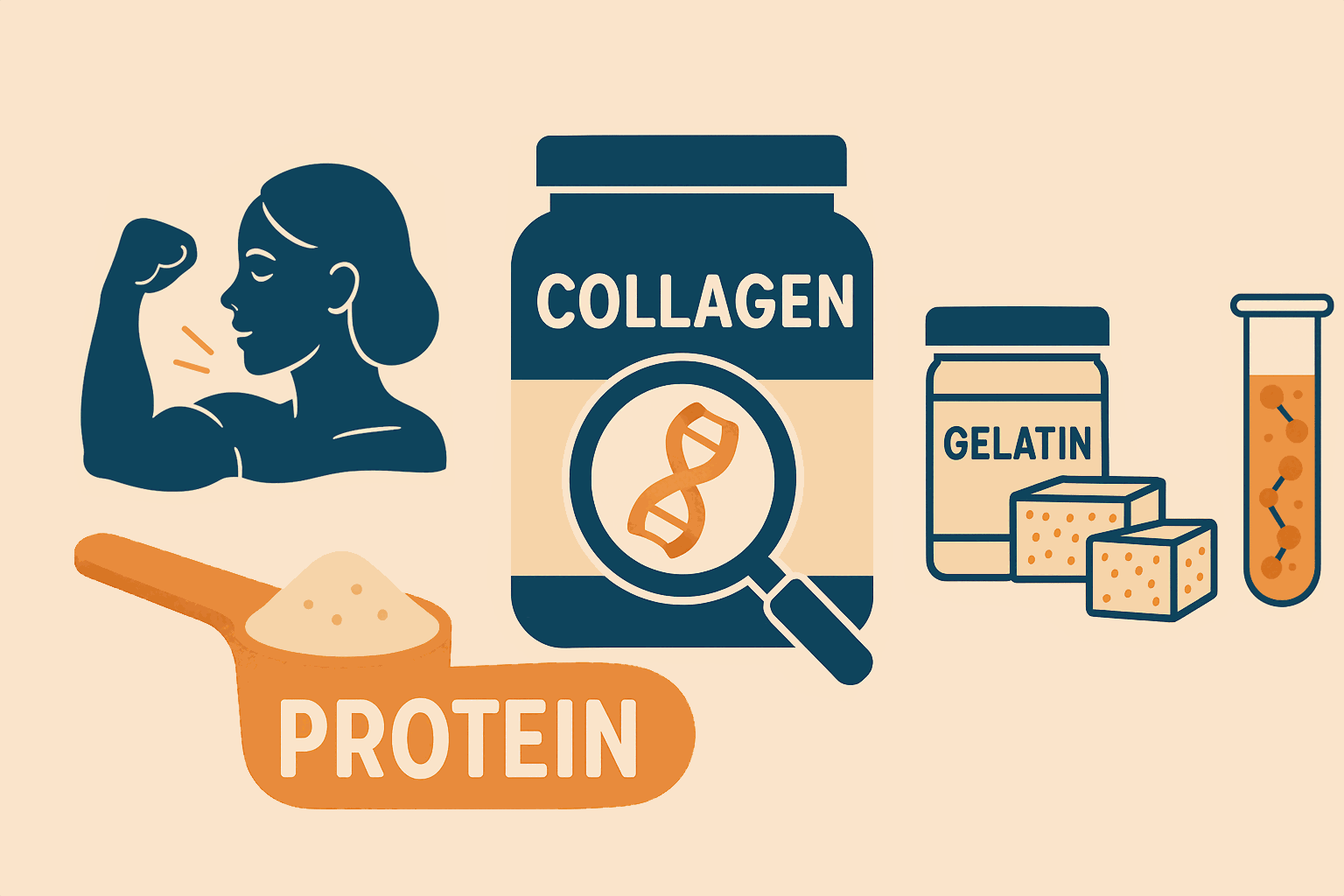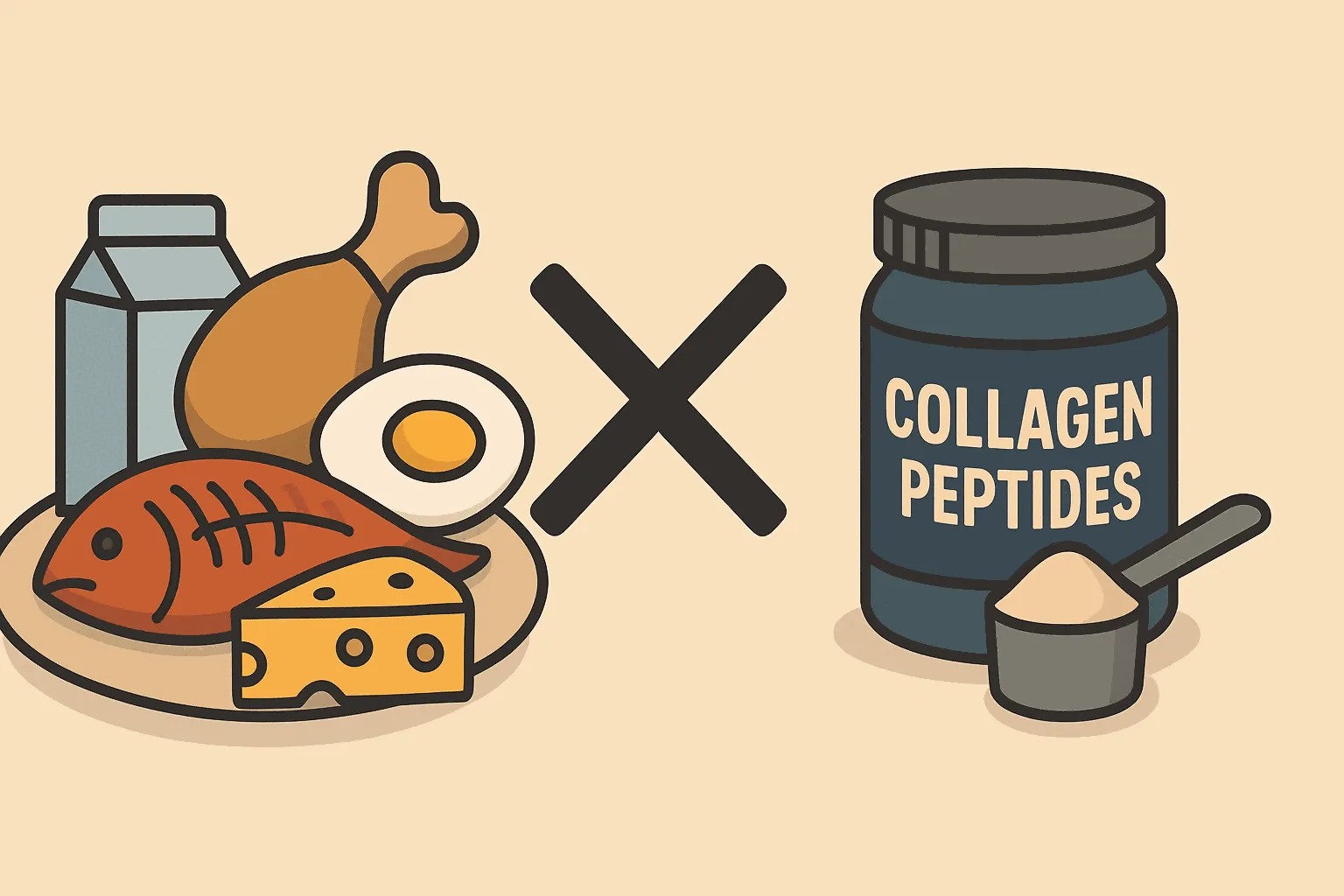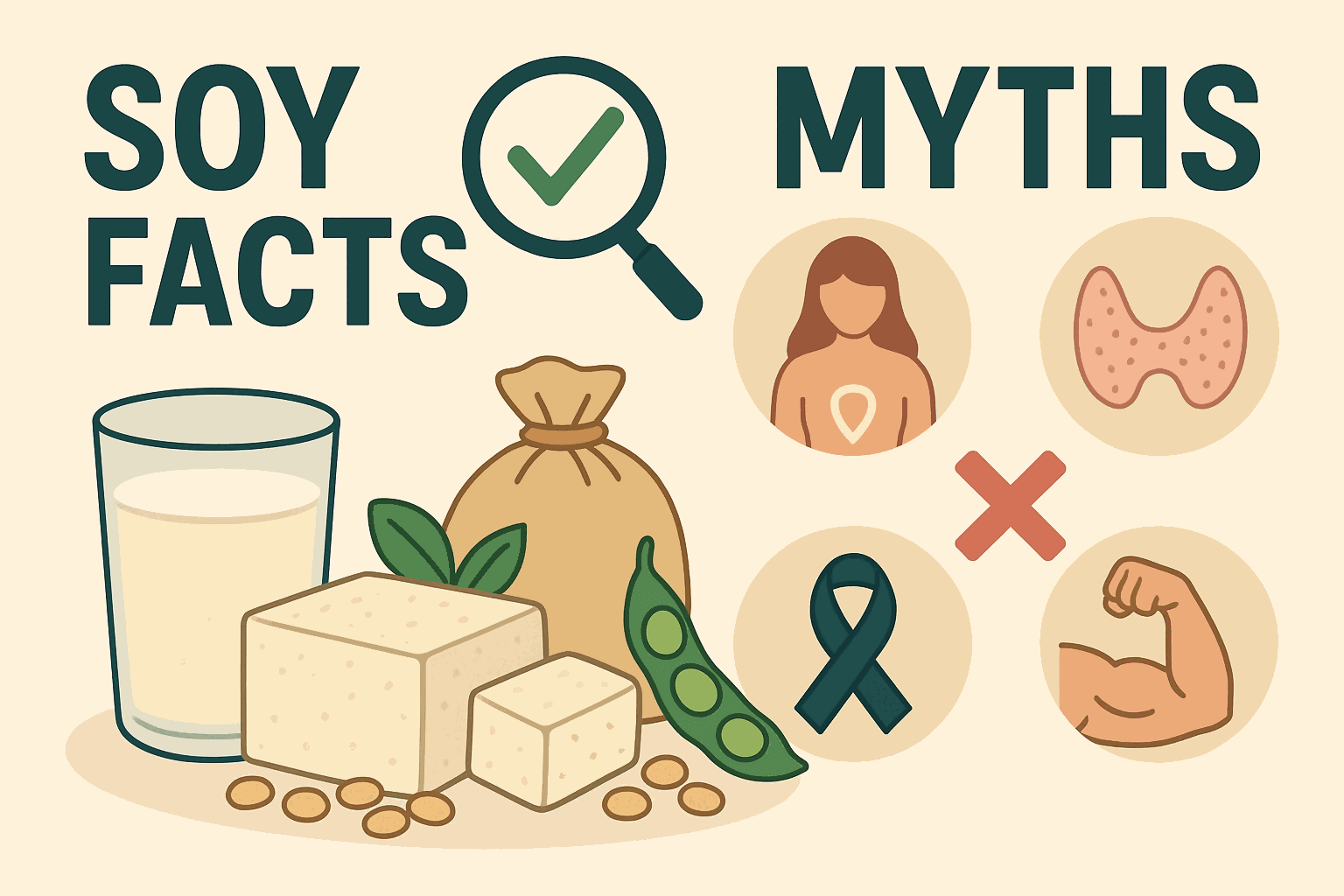
Collagen Deep Dive: Separating Science from Hype (Peptides vs. Gelatin, Protein & Real Benefits)
- Marcus Reed
- Nutrition , Supplements , Health & wellness , Skin care
- May 12, 2025
Table of Contents
Fast Facts: Collagen Essentials (TL;DR)
- Peptides vs. Gelatin: Collagen peptides (hydrolyzed collagen) are smaller, potentially more easily absorbed protein fragments than larger gelatin chains.
- Unique Building Blocks: Collagen supplements provide high concentrations of specific amino acids (glycine, proline, hydroxyproline) that act as signals to stimulate your body’s own collagen production.
- Not Just Protein: While dietary protein is vital, collagen peptides offer targeted support for tissues like skin and cartilage due to their unique structure and signaling role.
- Science-Backed Benefits: Strong evidence supports collagen peptides for improving skin hydration, elasticity, reducing wrinkles, and supporting joint health and comfort.
- Effective Dosage: Research suggests 2.5–15 grams of collagen peptides daily is effective and generally safe for most adults. Gelatin doses are typically higher (10-15g).
Unpacking Collagen: Beyond the Buzzwords
Collagen is the most abundant protein in our bodies, acting like scaffolding for skin, bones, tendons, ligaments, and connective tissues. As we age, natural collagen production declines, leading to common signs like wrinkles, sagging skin, and joint stiffness. This has fueled a booming market for collagen supplements, but also a cloud of confusion and myths. Let’s separate scientific fact from marketing fiction.
Myth 1: Gelatin is the Same as Collagen Peptides (Hydrolyzed Collagen)
The Claim: You can just eat gelatin (like in bone broth or Jell-O) and get the same benefits as expensive collagen peptide powders.
The Science: Both gelatin and collagen peptides originate from native collagen (usually from bovine, marine, or chicken sources). The difference lies in processing and structure:
- Gelatin: Created by partially breaking down collagen using heat (cooking). This results in large peptide chains that form a gel in liquid. Your body still needs to digest these larger chains further.
- Collagen Peptides (Hydrolyzed Collagen): Created by using specific enzymes (enzymatic hydrolysis) to break collagen down into much smaller, more easily digestible peptide fragments. These don’t gel in liquid.
Key Differences & Why They Matter:
- Bioavailability & Absorption: Smaller peptides are generally absorbed more readily through the gut lining [1, 7]. Studies show specific di- and tripeptides (like Pro-Hyp and Gly-Pro-Hyp) from hydrolyzed collagen appear in the bloodstream after ingestion, suggesting they survive digestion to some extent [1].
- Targeted Action: These smaller, specific peptides (particularly those rich in hydroxyproline) are thought to act as signaling molecules, directly stimulating fibroblasts (in skin) and chondrocytes (in cartilage) to produce more collagen, elastin, and hyaluronic acid [9]. While gelatin provides the amino acid building blocks, the signaling effect might be less pronounced due to the larger, less specific peptide structures requiring more digestion.
Verdict: While gelatin provides collagen’s amino acids, collagen peptides likely offer superior bioavailability and targeted signaling effects due to their pre-digested, smaller peptide structure. For specific benefits like skin elasticity or joint repair shown in studies, peptides are the form typically researched [3, 2].
Myth 2: Eating Enough Protein Makes Collagen Supplements Unnecessary

The Claim: If you eat a high-protein diet (meat, fish, eggs, dairy), you get all the amino acids needed, so collagen supplements are redundant.
The Science: This myth misunderstands how collagen peptides work. Yes, all proteins break down into amino acids in your digestive system. However:
- Unique Amino Acid Profile: Collagen is exceptionally rich in glycine, proline, and hydroxyproline. While your body can make some of these, supplementing provides a concentrated dose.
- Bioactive Peptides: As mentioned, specific small peptides from hydrolyzed collagen can be absorbed intact [1]. These aren’t just random amino acids; they are specific sequences (like Gly-Pro-Hyp) that act as biological signals [9]. They essentially “tell” your cells to ramp up collagen production where needed.
- Targeted Delivery: These bioactive peptides have been shown to accumulate in tissues like skin and cartilage after ingestion, where they exert their effects [4]. Standard dietary protein provides a general pool of amino acids for overall bodily needs, but lacks this specific signaling mechanism and targeted delivery potential attributed to collagen peptides.
Clinical Evidence: Meta-analyses consistently show benefits for skin (wrinkles, hydration, elasticity) [3] and joints [2] specifically from collagen peptide supplementation, benefits not typically replicated just by increasing general protein intake without those specific bioactive peptides.
Verdict: While a sufficient protein intake is crucial for overall health and providing basic amino acid building blocks, collagen peptides offer unique, targeted benefits through their specific amino acid profile and bioactive signaling peptides that general dietary protein doesn’t replicate in the same way.
Proven Benefits of Collagen Peptides: What the Science Says
Research, primarily on hydrolyzed collagen peptides, supports several key benefits:
1. Skin Health: Improving Hydration, Elasticity, and Wrinkles
- Multiple meta-analyses and systematic reviews confirm that oral collagen peptide supplementation (typically 2.5-10g/day for 8-12 weeks) significantly improves skin hydration, elasticity, roughness, and density [3, 5, 11].
- Mechanism: Bioactive peptides stimulate fibroblasts in the dermis to synthesize more Type I collagen, elastin, and hyaluronic acid, helping to replenish the skin’s structural matrix [5, 9].
2. Joint Health: Easing Pain and Improving Function
- Studies show collagen peptides (often around 8-10g/day) can reduce activity-related joint pain, particularly in athletes, and improve symptoms in individuals with osteoarthritis [2, 8, 15]. Both hydrolyzed collagen and undenatured type II collagen (UC-II, often in smaller doses) show promise, possibly working through different mechanisms (building blocks vs. immune modulation) [2].
- Mechanism: Peptides provide building blocks for cartilage repair and may stimulate chondrocytes. They might also have mild anti-inflammatory effects within the joint [2].
3. Other Potential Areas (Emerging Evidence)
- Bone Health: Some studies suggest collagen peptides may support bone mineral density, especially when combined with calcium and vitamin D.
- Wound Healing: As collagen is crucial for tissue repair, supplementation may support the healing process [12].
- Gut Health: Glycine, abundant in collagen, plays a role in gut barrier function. Some research explores collagen’s potential role in gut health, but more is needed [14].
- Hair and Nails: Limited but positive research suggests collagen may improve brittle nails [13] and potentially hair thickness, though more robust studies are required.
Practical Guide: Choosing and Using Collagen Supplements
- Type: Look for hydrolyzed collagen or collagen peptides for better absorption and the benefits shown in most skin/joint studies.
- Source: Common sources are bovine (cow), marine (fish), porcine (pig), and chicken. Marine collagen is primarily Type I, while bovine contains Type I and III. Choose based on dietary preferences or restrictions. Some joint formulas use Type II collagen (often from chicken).
- Dosage:
- Collagen Peptides: 2.5g to 15g per day is the range used effectively in studies. 5-10g is a common recommendation for skin and joint health [3, 2].
- Gelatin: Often requires higher doses (10-15g+) and needs to be dissolved in hot liquid or used in recipes.
- Timing & Absorption: Can be taken anytime, with or without food. Some suggest taking it with Vitamin C, as Vitamin C is essential for collagen synthesis in the body [6], though absorption of the peptides themselves isn’t necessarily Vitamin C dependent.
- Quality: Choose reputable brands that ideally engage in third-party testing for purity and contaminants (like heavy metals). Look for certifications like NSF or Informed-Sport if you are an athlete.
Safety and Side Effects
Collagen peptide supplements are generally considered safe and well-tolerated for most adults, even in long-term studies (up to 12 months) [10]. Potential side effects are usually mild and infrequent, including:
- Feelings of fullness or bloating
- Mild digestive upset (diarrhea)
- Unpleasant taste (less common with newer formulations)
Disclaimer: As with any supplement, it’s wise to consult your healthcare provider before starting, especially if you have pre-existing health conditions (like kidney disease), are pregnant or breastfeeding, or take other medications.
The Bottom Line: Collagen is Promising, Not Magic
Collagen peptides are not a miracle cure-all, but the scientific evidence supporting their benefits for skin and joint health is substantial and growing. They work differently than simply eating more protein due to their unique structure and bioactive signaling properties. While gelatin provides collagen’s amino acids, peptides offer potentially better absorption and targeted effects.
Focus on high-quality hydrolyzed collagen supplements within the research-backed dosage range, maintain a balanced diet rich in whole foods, and have realistic expectations.
Disclaimer
The information provided on BioBrain is intended for educational purposes only and is grounded in science, common sense, and evidence-based medicine. It is not a substitute for professional medical advice, diagnosis, or treatment. Always consult a qualified healthcare provider before making significant changes to your diet, exercise routine, or overall health plan.
References
- Shigemura, Y., et al. (2019) "Appearance of Di- and Tripeptides in Human Plasma After Collagen Peptide Ingestion"
- García-Coronado, J. M., et al. (2023) "Effect of Collagen Supplementation on Osteoarthritis Symptoms: A Meta-Analysis of Randomized Controlled Trials"
- de Miranda, R. B., et al. (2021) "Effects of Hydrolyzed Collagen Supplementation on Skin Aging: A Systematic Review and Meta-Analysis"
- Watanabe-Kamiyama, M., et al. (2010) "Absorption and effectiveness of orally administered low molecular weight collagen hydrolysate in rats"
- Wang, H. (2021) "A Review of the Effects of Collagen Treatment in Clinical Studies"
- Pullar, J. M., et al. (2017) "The Roles of Vitamin C in Skin Health"
- Al-Atif, H. (2022) "Collagen Supplements for Aging and Wrinkles: A Paradigm Shift in the Fields of Dermatology and Cosmetics"
- Clark, K. L., et al. (2008) "24-Week study on the use of collagen hydrolysate as a dietary supplement in athletes with activity-related joint pain"
- León-López, A., et al. (2019) "Hydrolyzed Collagen—Sources and Applications"
- Choi, F. D., et al. (2019) "Oral Collagen Supplementation: A Systematic Review of Dermatological Applications"
- Rustad, A. M., et al. (2022) "Myths and media in cosmetic dermatology: A systematic review of collagen supplements"
- Mathew-Steiner, S. S., et al. (2021) "Collagen in Wound Healing"
- Hexsel, D., et al. (2017) "Oral supplementation with specific bioactive collagen peptides improves nail growth and reduces symptoms of brittle nails"
- Chen, Q., et al. (2022) "Collagen peptides ameliorate intestinal epithelial barrier dysfunction in intestinal porcine epithelial cells via suppressing cellular apoptosis and modulating amino acid metabolism"
- Khatri, M., et al. (2021) "The effects of collagen peptide supplementation on body composition, collagen synthesis, and recovery from joint injury and exercise: a systematic review"
Tags :
- Collagen
- Collagen peptides
- Hydrolyzed collagen
- Gelatin
- Protein
- Skin health
- Joint health
- Anti aging
- Supplements
- Evidence based
- Nutrition science


